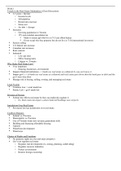Class notes
Class notes REAL ESTATE - MIDTERM NOTES
- Course
- REAL ESTATE
- Institution
- Ryerson University (Ru )
Trends in the Real Estate Marketplace Why Study Real Estate Law? Legal System • Common Law = court made law • Statute Law = gov't made law Division of Powers • Federal law effects real estate bc they can indirectly regulate it o Ex. Real estate developers cannot build tall building...
[Show more]



